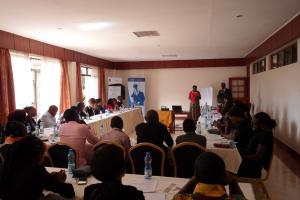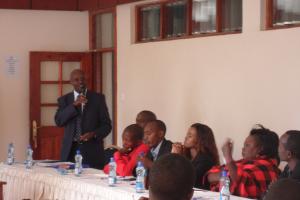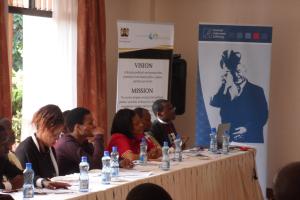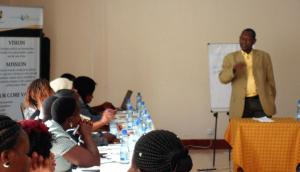Workshop on political parties’ internal dispute resolution - Foundation Office Kenya
Workshop
Details
In order to promote a peaceful dialogue among members of political parties as well as to enhance the skills of political actors for conflict management, the Konrad Adenauer Stiftung partnered with the “Political Parties Disputes Tribunal” (PPDT). A consultative workshop was held in Nakuru from 10th to 12th May 2016 and was attended by 38 youth and women leagues’ representatives from fifteen registered political parties. The main objective of this meeting at county level was to build the capacities of the youth and women leaders in the management of political parties’ disputes. This was implemented by a training especially focused on endowing the participants with in-depth knowledge on dispute resolution in general and the model internal election and political dispute resolution (EPDR) rules for political parties in particular.
The management of political party affairs is certain to involve disputes between members and their parties. Internal dispute issues for political parties in Kenya range from nomination, management of assets, membership (including subscription especially for elected members), leadership, and dissolution, among many others. Given the fact that next general elections in Kenya are scheduled for August 2017 and tensions within political parties might even be increasing during a pre-election phase, there is an urgent need for effective dispute resolution mechanisms within political parties. If such disputes are not resolved speedily and amicably, the results may be far reaching for both the party and the nation. For the party, disputes may result in formation of camps within the party, decamping of members to other parties, the weakening of the party and in some cases, the actual demise of the party in question.
Whereas in a democratic environment political debate and conflicts can be anticipated, they must be managed within a framework that prevents conflicts from escalating. Within political parties, the internal party rules system must not only foster intra-party debate but also regulate the mitigation and resolution of disputes arising from political party activities. Outside of the internal party rules system, there must be a mechanism of a judicial nature for adjudicating on disputes arising from political parties’ activities in a manner that promotes democracy, justice and rule of law.
Political Parties Disputes Tribunal with mediating function
Considering this background, the Political Parties Disputes Tribunal (PPDT) is an institution that is mandated with fair, just and expeditious resolution of disputes arising from political parties’ activities. Therefore it has a role in enhancing the internal capacity of political parties to resolve disputes in a matter that promotes inter-party and intra-party dialogue. Following a consultative process in 2014-2015 involving political parties at the national level, the PPDT developed model rules for internal dispute resolution for political parties that aim at promoting effective internal dispute resolution for political parties in Kenya.
KAS-forum promotes inter-party dialogue and enhances participants’ capabilities in effective dispute resolution
The two day lasting workshop in Nakuru was designed to cultivate inter-party dialogue on the management of political parties’ internal disputes and to apprise the participants of the mechanisms for political parties’ dispute resolution with emphasis on the role of the PPDT and the utilization of the model rules. Above all, the consultative forum was highly interactive and involved group work on dispute management for political parties as well as many sessions for questions and answers. The participants were invited to discuss, in groups, some of the common disputes they have experienced in their parties, how their parties have resolved the disputes, and their recommendations on the best model for dispute resolution for political parties. By implementing this activity, KAS provided the youth and women leaders with an important opportunity to share their experiences and provided an avenue to draw lessons on how dispute resolution can be enhanced for political parties.
Amongst others, the findings of the group works done during the consultative meeting in Nakuru include e.g. the following aspects below.
Sources of Intra Party Disputes:
- Nominations disputes
- Membership disputes
- Godfather syndrome
- Good governance within the party – the conduct of leaders
- Fair hearing and the rule of law when taking disciplinary action for members
- Management of the party’s finances/assets
- Membership contributions, especially for elected representatives
Sources of Inter-Party Disputes:
- Sharing political parties’ funds
- Disagreements between coalition partners
- Tyranny of numbers by bigger parties who use their numbers to pass legislation or resolutions in Parliament
Proposals for effective intra-political party dispute resolution:
- Adherence to the party Constitution
- Attendance of party meetings to diffuse conflict
- Loyalty among members
- Installation of an independent internal disciplinary committee
- Having an (external) independent body to solve a dispute
- Having guidelines and principles to guide the dispute resolution process, to assist the independent (external)
committee
- Disputes to be solved first internally before approaching the PPDT for litigation
- Parties should adopt mediation in dispute resolution
- Ensuring free and fair nominations to the extent possible
- Discouraging nepotism and impunity within political parties
- Nominations should be free and fair, and members should be the one to elect the party flag bearers
- Party contributions should have a clause on membership contributions which should be deducted at the payroll
- Constitutional amendment to have an internal dispute tribunal
- Party membership should be long term so that people do not jump ship overnight
- Having in place strong financial controls to safeguard the party’s finances and assets, and party members’
interests
Proposals for effective inter-political party dispute resolution:
- Having coalition agreements to govern the relations between different parties
- Having well defined rules and regulations for handling coalition disputes
- An independent body to solve coalition disputes
- Opening the proceedings to the members of both parties to the coalition dispute







